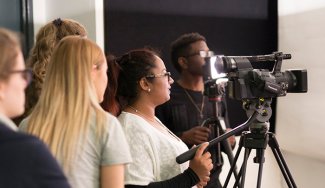

Why choose this course?
Develop your skills for a successful career in the screen and media industry with this qualification.
This hands on course will provide you with the knowledge you need to develop your creative and practical production skills to work effectively in the contemporary screen and media industries.
Benefit from learning from our lecturers, who are experienced industry practitioners. During your studies you will gain media skills that include the basics of picture composition and camera technique, industry specialised vision and sound editing, social media campaign management and content creation for the fast growing social media sector.
Career opportunities
- Camera Assistant
- Editing Assistant
- Production Assistant
-
An IELTS score (academic) of 6.0 with no band score less than 5.0 or equivalent.
-
Completion of the equivalent of Australian Year 10.
There may be further semester intakes available for enrolment. You can view any further intakes when you submit your online application(opens in a new tab).
For information about pathways from TAFE to university, view our Pathways to university page.
How to apply
Apply to study at TAFE in six steps:
- find a course;
- check entry requirements;
- submit an application;
- accept your offer and pay;
- apply for your student visa; and
- receive your visa and come to Australia for your studies.
Build your own course guide
Select the study areas, courses and topics you like. Get your custom guide by email!
Download study area guide(opens in a new tab)
Contact us(opens in a new tab)
TAFE International Western Australia (TIWA) is the Registered Training Organisation (RTO) and Commonwealth Register of Institutions and Courses for Overseas Students (CRICOS) provider, for the delivery of training to international students, enrolled in a TAFE course in Western Australia. This nationally recognised course is delivered by a Western Australian TAFE college on TIWA's behalf. TIWA retains responsibility for the quality of the training and assessment delivered by the TAFE colleges and for the issue of certification documentation to students.

